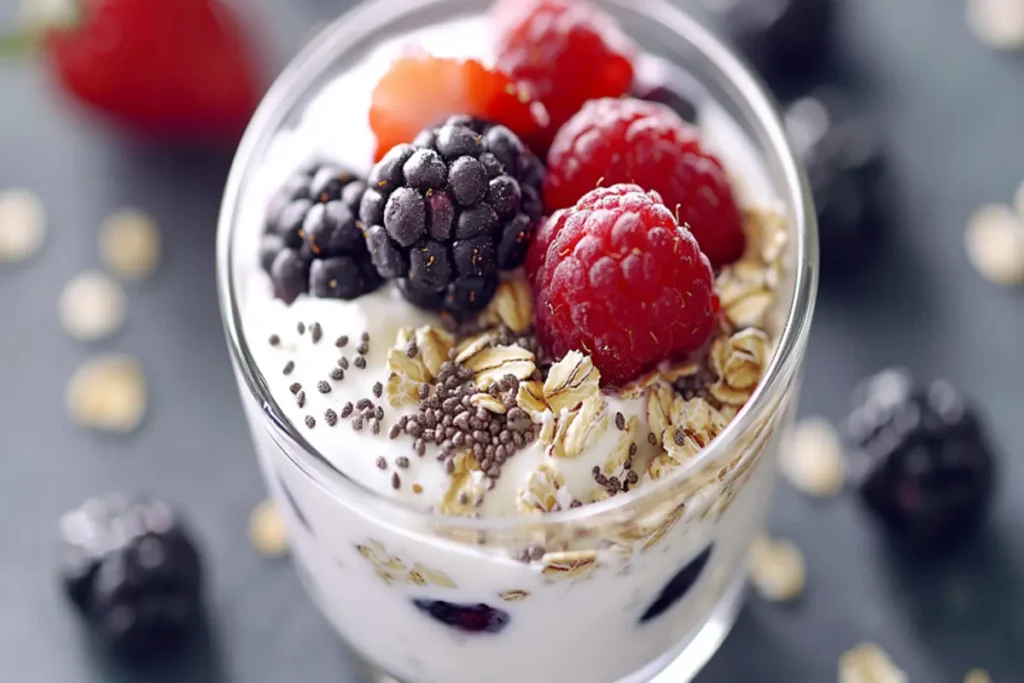Introduction
High-protein breakfasts can transform your health by fueling sustained energy levels, supporting muscle growth and recovery, and enhancing overall weight management. Unlike traditional high-carb breakfasts that cause a quick energy spike followed by a crash, a protein-rich breakfast delivers a steady source of fuel, keeping you fuller for longer and helping you maintain focus and productivity throughout the morning.
Many people struggle with morning fatigue and sluggishness, often caused by consuming low-protein, high-sugar meals like pastries, cereals, or white bread. These foods rapidly increase blood sugar levels, only to cause a dip shortly after, leaving you feeling hungry and fatigued within a few hours. Incorporating protein-dense foods into your breakfast helps regulate blood sugar levels, reduces cravings, and keeps you energized until your next meal.
Additionally, for individuals who engage in physical activities such as workouts, sports, or resistance training, consuming high-quality protein in the morning aids in muscle repair and growth. Protein is essential in rebuilding muscle fibers, preventing muscle loss, and supporting overall physical performance.
Even if your goal is weight loss, a high-protein breakfast plays a significant role in reducing overall calorie intake by curbing hunger and minimizing snacking on unhealthy foods later in the day. Studies have shown that individuals who consume adequate protein in the morning tend to have better appetite control and are less likely to overeat at lunch or dinner.
This guide covers the importance of protein at breakfast, detailed nutritional insights, over 30 protein-packed meal ideas, meal prep strategies, and frequently asked questions to help you build a sustainable and healthy morning routine tailored to your goals.
Why Protein in the Morning Matters
- Boosts Metabolism: Helps burn more calories throughout the day.
- Increases Satiety: Keeps you full longer, reducing unhealthy snacking.
- Supports Muscle Growth & Recovery: Essential for teens and athletes needing strength development.
- Improves Focus & Energy: Prevents mid-morning crashes caused by sugar-laden meals.
According to the National Institute of Health (NIH), protein should make up 10-35% of daily caloric intake, depending on age, gender, and activity level. However, most individuals do not meet their optimal protein needs, especially in the morning.
How Much Protein Do You Need in the Morning?
For an average adult, aiming for 20-30 grams of protein in the morning can significantly impact energy and muscle health. Athletes and teenagers may require higher amounts.
| Group | Recommended Protein Intake (Breakfast) |
|---|---|
| Adults | 20-30g |
| Athletes | 30-40g |
| Teenagers | 25-35g |
High-Quality Protein Sources
Wondering how to increase your protein intake? Here are some top choices:
- Eggs – 6g of protein per egg, packed with essential nutrients.
- Greek Yogurt – 15g per cup, rich in probiotics.
- Cottage Cheese – 14g per half-cup, great for muscle repair.
- Lean Meats (Turkey, Chicken, Beef) – 20g+ per serving.
- Tofu and Tempeh – Excellent plant-based alternatives.
- Protein Powders (Whey, Plant-Based, Casein) – Easily mixed into smoothies or oatmeal.
- Nuts and Seeds (Almonds, Chia, Flaxseed) – Provide both protein and healthy fats.
17 Best High-Protein Breakfast Recipes

1. Protein-Packed Scrambled Eggs
2. Greek Yogurt Power Bowl
3. Overnight Oats with Protein Boost
4. High-Protein Breakfast Burrito
5. Chia Seed Pudding
6. Smoked Salmon and Avocado Toast
7. Protein Smoothie Bowl
8. Quinoa Breakfast Bowl
9. Nut Butter and Banana Toast
10. High-Protein Pancakes
11. Peanut Butter Protein Smoothie
12. Spinach and Cheese Omelet
13. Chicken Sausage & Egg Muffins
14. Almond Butter Chia Pudding
15. Scrambled Tofu & Veggies
16. Cottage Cheese with Nuts & Honey
17. High-Protein Blueberry Muffins
Meal Prep Strategies for High-Protein Breakfasts
- Batch Cooking: Prepare egg muffins, overnight oats, and protein pancakes in advance.
- Freezing: Store pre-made smoothie packs or protein waffles for quick access.
- Portable Options: Keep protein bars or yogurt cups handy for busy mornings.
- Diverse Ingredients: Rotate protein sources to prevent meal fatigue.
Sample High-Protein Meal Plan
Breakfast: Greek Yogurt with Nuts & Honey (25g protein)
Snack: Almond Butter with Apple Slices (10g protein)
Lunch: Grilled Chicken Salad with Quinoa (35g protein)
Snack: Cottage Cheese with Berries (20g protein)
Dinner: Salmon with Roasted Vegetables (40g protein)
Frequently Asked Questions
1. What is the best high-protein breakfast for weight loss?
A high-protein breakfast that includes lean proteins and healthy fats—such as Greek yogurt with nuts and berries, or scrambled eggs with spinach—is excellent for weight loss. These meals keep you full for longer, reduce cravings, and help maintain muscle mass while burning fat.
2. Can I build muscle with a high-protein breakfast?
Yes! A balanced meal with lean protein and healthy fats, such as a protein smoothie with almond butter and whey protein or an omelet with chicken and vegetables, provides the essential amino acids required for muscle repair and growth.
3. How can vegetarians get enough protein in the morning?
Vegetarians can opt for plant-based protein sources such as tofu scramble, chia seed pudding, quinoa porridge, and almond butter on whole grain toast. Adding protein powders from pea or soy can further boost protein intake.
4. Is it necessary to eat protein immediately after waking up?
While not essential, consuming protein within 30-60 minutes of waking up helps kickstart metabolism and provides stable energy levels throughout the morning. If you’re active, this can also enhance muscle recovery and fat burning.
5. Can I prepare high-protein breakfasts in advance?
Absolutely! Meal-prepping options like overnight oats with protein powder, egg muffins, Greek yogurt parfaits, and smoothie packs can save time while ensuring you get the nutrients needed to start the day right.
6. What are some quick high-protein breakfast options for busy mornings?
If you’re short on time, try hard-boiled eggs with whole-grain toast, protein shakes with nut butter and banana, or cottage cheese with flaxseeds and fruit. These options require minimal prep but provide a powerful protein boost.
7. Can a high-protein breakfast help with energy levels?
Yes! Unlike carb-heavy breakfasts that cause energy crashes, a protein-rich meal stabilizes blood sugar levels and provides sustained energy throughout the day. This helps with mental clarity, productivity, and overall alertness.
8. How does a high-protein breakfast impact metabolism?
Protein has a higher thermic effect than carbohydrates or fats, meaning your body burns more calories digesting it. This boost in metabolism aids in weight management and fat loss while preserving lean muscle mass.
9. Can children also benefit from a high-protein breakfast?
Yes! Children need adequate protein for growth and development. Options like Greek yogurt with fruit, peanut butter on whole wheat toast, or scrambled eggs with cheese provide essential nutrients for their cognitive function and energy levels.
10. Should I eat carbs with my high-protein breakfast?
Should I Eat Carbs with My High-Protein Breakfast?
Absolutely! Including complex carbohydrates alongside protein in your breakfast is essential for a balanced and energizing start to your day. Carbs are your body’s primary source of energy, and pairing them with protein helps stabilize blood sugar levels, keeping you full and focused for longer.
Benefits of Pairing Carbs with Protein
- Sustained Energy: Complex carbs, such as oats, quinoa, and whole-wheat bread, release energy slowly, preventing mid-morning crashes.
- Improved Muscle Recovery: Combining protein with carbs helps your body replenish glycogen stores, especially if you’re active or working out in the morning.
- Enhanced Satiety: Fiber from whole grains and fruits keeps you fuller longer, while protein helps curb hunger hormones.
Best Carbs to Pair with Your High-Protein Breakfast:
- Whole Grains: Oatmeal, quinoa, whole-wheat toast, or overnight oats provide fiber and slow-digesting energy.
- Fruits: Berries, bananas, and apples add natural sweetness, fiber, and antioxidants.
- Starchy Vegetables: Sweet potatoes or pumpkin are nutrient-rich options to pair with eggs or Greek yogurt.
Balanced High-Protein Breakfast Ideas:

- Greek Yogurt Parfait: Layer Greek yogurt with oats, chia seeds, and berries for a protein and fiber-packed meal.
- Egg and Avocado Toast: Whole-wheat toast with scrambled eggs and avocado offers protein, fiber, and healthy fats.
- Protein Smoothie Bowl: Blend protein powder with banana and oats, then top with nuts and seeds for a balanced breakfast.
By incorporating both complex carbs and protein into your morning meal, you can ensure steady energy levels, promote muscle health, and feel fuller for longer—helping you power through your day effectively.
conclusion
Starting your morning with a high-protein breakfast is essential for maintaining energy levels, improving focus, and supporting muscle growth. Whether you prefer eggs, Greek yogurt, lean meats, or plant-based options, incorporating protein-rich foods into your diet enhances overall well-being and sets the stage for a healthier lifestyle.
By making small yet impactful dietary changes, such as replacing sugar-heavy cereals with protein-packed oatmeal, adding a protein smoothie to your morning routine, or choosing scrambled eggs with vegetables, you can significantly boost metabolism, improve digestion, and regulate blood sugar levels.
Over time, consistently choosing a protein-rich breakfast can contribute to long-term health benefits, including better muscle maintenance, increased fat loss, reduced cravings, and improved cognitive performance. Research suggests that individuals who consume a higher protein intake in the morning tend to experience better weight control, improved energy stability, and fewer afternoon energy crashes.
Furthermore, a protein-rich morning routine can enhance physical performance, particularly for those who engage in exercise, resistance training, or endurance sports. By ensuring your body has the necessary amino acids and essential nutrients, you are better prepared to support muscle recovery and optimal performance throughout the day.
Consistency is key—prioritizing high-protein breakfast daily can lead to sustainable energy, improved concentration, and overall wellness. Take the first step towards a nutritious and energizing morning routine today!
For more in-depth meal planning strategies, recipe inspiration, and additional nutritional guidance, visit the Mayo Clinic or explore evidence-based resources at Harvard Health.


1 thought on “High-Protein Breakfasts: The Ultimate Guide for Energy and Nutrition”